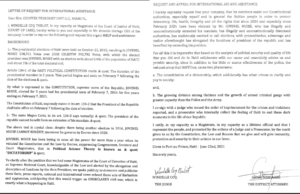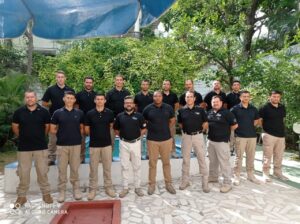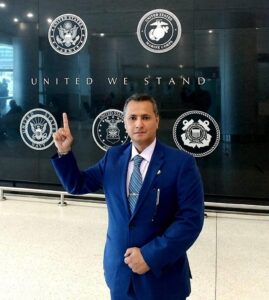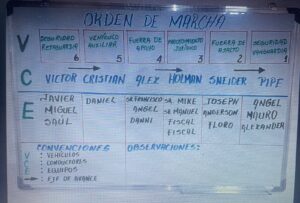Article • Haiti Watch
Exclusive: How Haiti’s Assassination Plot Unraveled, Minute by Minute and Text by Text

Article • Haiti Watch
Fact-based, data-driven research and analysis to advance democratic debate on vital issues shaping people’s lives.
Center for Economic and Policy Research
1611 Connecticut Ave. NW
Suite 400
Washington, DC 20009
Tel: 202-293-5380
Fax: 202-588-1356
https://cepr.net
A French version of the article is available from Ayibopost here. A Spanish version is available here.
On the morning of July 7, 2021, the alleged assassins of Jovenel Moïse, Haiti’s president, scrambled to escape the aftermath, pinned down just blocks from his home by Haitian police who responded to the scene. Their planned escape route was blocked. The news of the president’s death had already hit the airwaves, and people had begun setting alight tires in the streets.
“We’re in the shit, guys,” Sgt Duberney Capador, a highly-trained former Colombian soldier, wrote in a WhatsApp group chat at 4:56 am. “We’re in the middle of a war and nobody is responding,” he added. Roughly three hours after Moïse’s death, the soldier was still unable to reach the two men who had hired him, owners of a Miami-area security firm. Their audacious plot to seize power didn’t appear to be going to plan.
Antonio Intriago, one of the owners of the security firm, Counter Terrorist Unit Federal Academy (CTU), finally responded about 30 minutes later. “I’m trying to call Gabriel,” he wrote, a reference to Arcangel Pretel, his partner in CTU, and the man who had personally recruited Capador and some 20 other former Colombian soldiers into the plot. Pretel, the FBI has admitted, was an active informant with the agency at the time.
“We’re barricaded in on both sides,” Capador wrote at 5:26 am. “We’re surrounded […] get us out of here,” he added a few minutes later.
An hour later, Intriago confirmed with Capador that his partner, Pretel, had finally gotten in touch. “Ok, in God’s name all will turn out well,” Intriago wrote.
“I hope so, we’ve done the hard part,” Capador responded.
His boss wrote back: “We’re making calls, but we don’t understand what happened.”
“Well, they betrayed us, that’s what happened,” Capador ventured.
The Whatsapp transcript
The records from the WhatsApp group chats, obtained by the authors from an anonymous source close to the investigation into Moïse’s death, are now part of thousands of pages of evidence in an ongoing US Department of Justice case against 11 alleged conspirators currently jailed in South Florida. A trial set for May has been postponed until later this year.

One of the 11 defendants, convicted drug trafficker and former DEA informant Rodolphe Jaar, has already pleaded guilty. Eight of the others, including Intriago, Pretel, and their financier Walter Veintemilla, face up to life in prison if found guilty. Two of the Colombian soldiers have also been extradited to Miami, while the remainder — as well as dozens of additional suspects — are detained in Haiti and have yet to be formally charged.
According to the US Department of Justice, Intriago and Pretel “managed and directed the other members of the conspiracy,” including the Colombians. Yet, the chats reveal that, for hours after the raid on the president’s home, the leaders of the Colombian soldiers were unable to reach the two men in Florida that the Department of Justice allege are at the center of the plot.
Though only offering a partial accounting, the newly obtained WhatsApp chats provide a dramatic narrative of the events that unfolded in the hours and days after the assassination, as well as new insight into the intention of the alleged conspirators. They also raise significant questions about the narrative presented by US prosecutors and the role played by various foreign embassies. Those currently in US custody, many of whom appear in the chat logs, come across as confused, at the mercy of their local Haitian partners — many of whom remain at-large — and begging for the intervention of international diplomats.
The 50-page transcript of messages come from multiple group chats, each including different members. However, some key pieces of information are missing, and the transcript of the chat appears incomplete. Little or no mention is made of Moïse’s fate, though all appeared aware that he was dead, even exchanging media reports confirming his assassination. Nor do the messages reveal who gave the order to kill Moïse, or a motive.
Some of the messages are between persons using nicknames or codenames, phrases are garbled, words misspelled, and alternate between three languages: Spanish, English and French. But the participants’ identities are not hard to figure out from the chat, information in court documents, as well as private investigators and family members of the Colombians.*
Doubts and uncertainty haunted the plot before July 7
The day before the assassination, Intriago sent a message addressed to Walter Veintemilla, an Ecuadorian-American financier who had provided CTU with a $175,000 credit line, ostensibly part of an effort to invest in some development projects, including a solar energy plant, while also providing security for a presidential hopeful, Christian Sanon, a Haitian-American pastor. Initially, the plan had been to replace President Moïse with a transitional government led by Sanon; the big economic opportunities to come were contingent on that.
“Walter as you see the conditions are in place but remember that the 20 men were sent a month ago and we have to pay their payrolls,” Intriago wrote, in reference to the Colombians hired by CTU, who had yet to receive any compensation.
Veintemilla responded, saying his resources were exhausted. “None of the investors are willing to give a penny,” he wrote.
“Well Walter, how do we say that to [the] boys? You [Pretel] and I know that today we are more sure of what we are doing and that the work is going to be carried out successfully,” Intriago wrote, adding that they had already signed three contracts for the development of garbage, electricity, and water projects. Intriago later added that he had contacted the Colombians to ask for an extra week to pay them.
According to US prosecutors, however, by early July, plans had shifted. Sanon was no longer seen as a viable presidential candidate. Instead, CTU and their Colombian security team had found a new leader to back: Wendelle Coq, a former supreme court judge who had been fired by Moïse months earlier.
In mid-June, many of the alleged conspirators claimed to have met with Coq at the judge’s home, just a few hundred meters from the president’s. There, Coq and another judicial official allegedly signed a document authorizing the arrest of President Moïse and promising immunity to those involved. James Solages, a Haitian-American who was working with CTU, personally traveled to Florida and delivered the document to CTU. That letter, the authenticity of which is disputed by Coq and the other official, is a critical piece of evidence in the case as it provides much of the basis for US legal jurisdiction.

“We’re in this together”
The morning of July 7, Intriago, on a family trip in Texas, woke up to news of the president’s death. The Venezuelan-American, who had been running his small business from an office building in Doral, just west of Miami International Airport, appeared to be caught by surprise. The Haiti security contract was only two months old. Before that, he’d mostly been selling bullet-proof vests in Miami and doing security training courses. “I don’t know yet what happened,” he repeated in one of the group chats, and soon began the long drive back to Florida. But, nowhere in the chats is there a discussion or questioning of what actually happened overnight in the hills above Port-au-Prince.
Whatever happened, however, the chats make clear that those involved expected Coq, the judge, to take charge. “It is imperative that she take responsibility now,” Intriago wrote just past 6:30 am, in reference to Coq, who is codenamed ‘El Diamante’ (The Diamond) throughout the chats.
“If the judge isn’t sworn in, they will cut off all our heads, including hers … all of us,” responded German Rivera, going by the alias ‘Colonel Mike.’ “We are in your hands.”
“And in those of God. We’ll triumph,” Pretel responded immediately.
“We’re in this together, brother,” Intriago assured.
Seeking protection from the police and embassies
While nobody seemed to know what the judge was doing, or why she had yet to make any pronouncement, the focus of the chats shifted toward getting the police to back off. The chats contain reports of snipers on nearby rooftops and drones flying overhead. Just before 10:00 am, one of the Colombians relayed a message from Jaar that the police were about to attack. Soon thereafter, Jaar shared contact information for Leon Charles, Haiti’s police chief.
“Chief of police need you to contact me asap,” Intriago wrote to Charles, according to messages forwarded to one of the chats. “There are some American that need to be protected. They were acting with a judge order and you must stop any confrontation.”
“We are contacting to offer you a welcome to work with us and get international protection for you and your family,” the message continued. “But you must stop now … Please allow until the judges and the media get the proper information […] As you know, an order of arrest against him was in place.”
There is no indication that Charles ever responded.
By early afternoon, the police attack had yet to materialize, but neither had any support for the trapped Colombians. At 1:25 pm, Intriago shared an update from one of the principal suspects in the assassination plot, a former Haitian justice ministry official, Joseph Badio.
“Badio is doing what he can and maintaining very positive communication with me and I am sure you’ll be out of there soon. I confirmed that there is an order (for the police) not to proceed and that they are clarifying things,” wrote Intriago. The message reveals, for the first time, Badio’s direct involvement within the CTU conspiracy.
Badio is a long-time associate of Haiti’s current prime minister, Ariel Henry. Phone records obtained as part of the investigation show that Badio and Henry had been in regular communication in the two weeks preceding the assassination, including in the hours after the raid. According to testimony from some of the detained Colombians, Badio attended planning meetings and was in the convoy of vehicles that drove to the president’s house on the morning of the assassination. He was also the primary link between CTU and Coq, the judge.
Rivera responded: “The important thing please, get us out.” Then he added, addressing Intriago by his codename: “Thanks Ariel but that’s what they said over an hour ago.”

Dr. Jean Marie: “We got your back”
Soon after, Pretel shared contact information for a Dr. Robert Jean Marie, a mysterious figure with an Atlanta area cell phone number who is presented as a representative of the US State Department. The group was told that Dr. Jean Marie would organize a rescue. Marie told a chat that he was also in touch with the Taiwanese ambassador to request asylum. “We got your back,” he wrote at one point.
Dr. Jean Marie’s contact information came from Badio, Pretel explained. Phone records show that Badio and Dr. Jean Marie spoke multiple times the morning of July 7.
There is nothing to indicate that Dr. Jean Marie was a representative of the US government. In fact, the chats suggest that he was not. Multiple messages sent by the authors to the phone number belonging to Dr. Jean Marie went unanswered.
A State Department spokesperson said it “would not comment on ongoing criminal investigations.” But it is clear, from the chats and other records, that nearly everyone implicated in the assassination believed they were operating with at least the tacit support of the US and Haitian authorities, and others in the international community. In a lengthy series of messages over the next few days, curated in several chat groups, the alleged conspirators repeatedly refer to contacts with US officials at the embassy in Port-au-Prince and the State Department, who they appeared to believe are making arrangements to rescue them. They also mention contacts with the embassies of Canada, the UK, and Taiwan. A Canadian government spokesperson responded after publication of this article, saying “there was no contact” between its officials in Canada or Haiti and the alleged conspirators.
“I was on the phone with the ambassador. I need you to send me the location of where you are,” Intriago wrote at 2:38 pm the afternoon of July 7. By then, the Colombians, unable to escape because of a police blockade, had sought refuge in an abandoned building. They had been surrounded for hours as their constant pleas for assistance fell on deaf ears. The police attack was imminent.
Just past 3 pm, Capador informed the group that the police had started firing at them. “Get us out of here,” Rivera (Col. Mike) added.
Twenty minutes later, Intriago responded: “Can you send photos of the intelligence collected. Urgent.”
It’s unclear what that is a reference to. There have been unconfirmed reports that the Colombians searched Moïse’s bedroom for documents and a large stash of cash, before stuffing some duffel bags and leaving the house. Two of the Colombians were later found dead with as much as $50,000 in their possession. But, the Colombians told Intriago, the “evidence” was not within their reach at the time. It’s likely that whatever was collected at the president’s house remained in their vehicles, parked in the middle of the road nearby. What they apparently didn’t yet know was that two of those vehicles had been set on fire, destroying whatever was left inside.
Around 4 pm, the Colombians reported that Haitian police had begun firing tear gas into the house where they were camped out. “Stop this shit, if not a lot of people will die,” Capador pleaded.
“Please do something” Solages added to the group chat. “Any update about the US Embassy?”
Intriago responded, saying he had just spoken to the Canadian ambassador and that he was trying to reach the ambassador of Taiwan. Its embassy, he explained, was just a few hundred meters from the Colombians’ location. A minute later he added that the State Department was “sending troops but they have to go through some paperwork.”
“We need Diamante to be sworn in … and for the US embassy to pick us up. There’s no other way,” Rivera responded.
Capador added: “They are hitting us with 50 caliber” heavy machine gun fire. “They have us cornered.”

Under fire: the Haitian police attack
Meanwhile, Intriago and Pretel were continuing with their supposed diplomatic onslaught to rescue the Colombians.
At 4:30 pm, Intriago shared the publicly listed numbers for the embassies of Taiwan and Venezuela. Twenty minutes later, Pretel sent the emergency contact number for the US Embassy in Port-au-Prince. He asked one of the group, who is a US citizen, to call the embassy and “explain to them that you guys work for CTU. You were on a mission to assist the judge and what happened […] They want to hear from you directly.”
Four minutes later, Col. Mike relayed that Solages was on the phone with the US Embassy.
At 5:10 pm Intriago informed the group that “I have just been told that they are calling from the US to stop the attack.” He asked for a list of names and a photo of the group to send to foreign embassies, Canada, Venezuela, and Taiwan to seek asylum.
The US government has previously made public that two Haitian-Americans involved in the plot, James Solages and a former DEA informant, Joseph Vincent, were in contact with US officials and were encouraged to surrender to Haitian police, which they subsequently did around 6:30 pm.
Shortly after the surrender of Vincent and Solage, which is not mentioned in the chats, Capador informed the group chat that things were getting worse. “They are firing on us with everything,” he wrote. At 8 pm, Pretel reported the first fatality, one of the Colombian soldiers. After about a one-hour break, Rivera again pleaded for assistance. “We have nowhere to go anymore,” he wrote at 9:37 pm. By then, the Colombians had been chased from the house and split up into groups. Rivera and ten others soon arrived outside the embassy of Taiwan. In the chaos, two more Colombians were killed, including Capador.
Just past 10:30 pm, Dr. Jean Marie informed Intriago that he had spoken with the ambassador of Taiwan and that help was on the way. Once again, however, the promised support failed to materialize. The group chats show constant activity throughout the evening of July 7 and into the morning of July 8. At one point, Pretel reported that the Colombians were hiding in a water tank outside the Taiwanese embassy, still waiting for someone to come let them in.
That night, at 2:14 am, Dr. Jean Marie sent a text: “The US commandos are on the way […] The US military Corps arrive around 3:AM or 3:30AM. The Advance team are already there.”
No US troops were ever mobilized.
As the sun rose the next morning, Intriago was still pleading for Dr. Jean Marie to help the Colombians enter the embassy. “Please the men need the alarm code from the embassy,” he wrote at 7:46 am.
It was not until 1:30 pm that afternoon, about 36 hours after the assassination, when Intriago told a group chat that the Colombians had finally made it inside the embassy. But, he added, the personnel from the embassy were still not present. They only made it inside because “someone opened the door and left.” It is unclear from the chats who that may have been.
By that time, Haitian police had already begun an operation to arrest those inside the embassy. At 5 pm on July 8, Intriago asked Dr. Jean Marie for an update from the Taiwanese. “We have more that an hour without communication and we are worried about their integrity,” he wrote. By then, all those inside the Taiwanese embassy had surrendered peacefully.
Taiwan has denied assisting the Colombians in entering its embassy, and claimed it worked with Haitian police to detain them as soon as it was made aware of their presence.
Over the next 24 hours, all but one of the Colombians were detained by Haitian police. The one individual who managed to evade capture, Mario Palacios, was apprehended months later in Jamaica and then sent to the US.

Epilogue
With CTU’s Haiti-based team in police custody, it didn’t take long for law enforcement — in Haiti and the US — to start knocking on doors.
At 7:30 pm on July 9, Intriago wrote that he had gotten a call from ‘Sami,’ seemingly a reference to Samir Handal, the man who had rented office space to Christian Sanon. “They took everything … they took the computers … including Sanon,” he added about an hour-and-a-half later. “Oooo jeez,” Pretel responded.
Even as the arrests rippled outward, Intriago and Pretel come across as confused about what really had happened over the previous days. “We have to be sure that they told us the truth,” Intriago wrote just after 9 pm.
“Of course we have to confirm everything,” Pretel responded. “If they made wrong decisions they’ll face consequences.”
Intriago, who was by that time back home in Miami, texted a group at 10:33 pm. “At my door there [are] two persons that said [they] are federal agents,” he wrote.
“What you gonna do?” replied Dr. Jean Marie.
“I don’t know if they really are,” responded Intriago.
Intriago, Pretel and Veintemilla would spend the next several days being interviewed by agents from the FBI and Homeland Security Investigations division. All three decided to cooperate, handing over their phones and computers to the agents.
Intriago and Veintemilla have maintained their innocence from the beginning of the investigation, claiming they were deceived by unknown persons in Haiti who framed the Colombians. Pretel has made no public statements. Many of the Colombians also claim they were duped, alleging that the president was already dead when they entered the house. While in jail, several of the former soldiers who entered Moïse’s residence admitted to carrying out the assassination in interviews with investigators. They now deny that version, saying the confessions were obtained under torture.
Intriago issued a public statement soon after the assassination stating that he and Pretel had held meetings with FBI agents at CTU’s office where their plans for “regime change” in Haiti were discussed. Earlier this year, this was confirmed by the FBI, though the agency said its agents declined to be involved. Intriago’s lawyers have claimed that their client was acting under the belief that the US government supported their efforts in Haiti.
It wasn’t until February 14 this year, more than 18 months after the assassination, that they were finally arrested and charged with plotting Moïse’s assassination.
Although Haitian authorities later issued arrest orders for Coq and Badio, both remain at large and have made declarations denying involvement in Moïse’s death.
* At times, the authors have corrected obvious typographical mistakes in the chat transcripts for clarity.
This post was updated on 5/4 to include a comment from the Canadian government.
David C. Adams is a former Univision News reporter and editor and long time reporter on Haiti, previously with Reuters and the Tampa Bay Times.
Jake Johnston is a Senior Research Associate at the Center for Economic and Policy Research and author of the forthcoming book, Aid State: Elite Panic, Disaster Capitalism, and the Battle to Control Haiti.